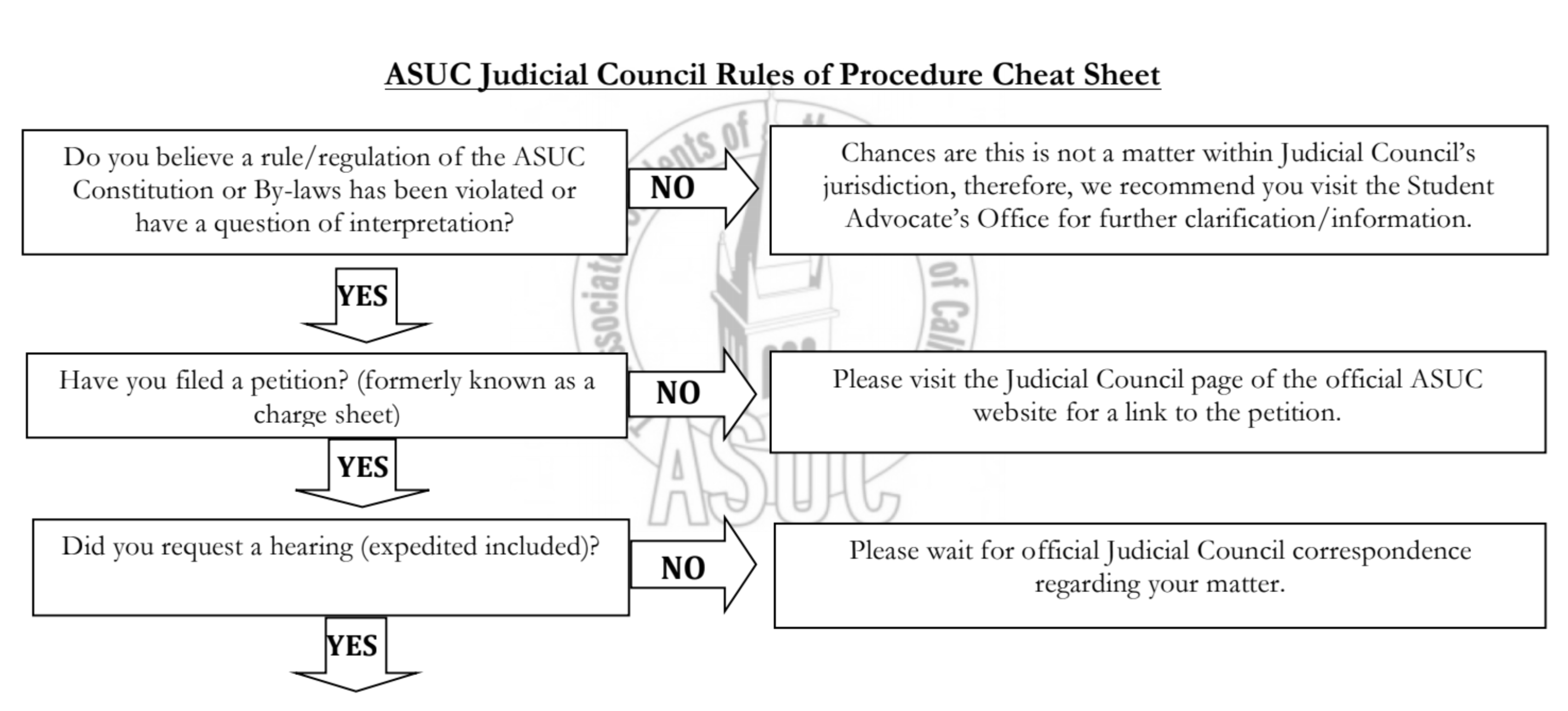JUDICIAL
JUDICIAL COUNCIL INFORMATION
The Judicial Council is vested with the judicial authority of the Associated Students of the University of California. It adjudicates any and all disputes that arise under the ASUC Constitution and By-Laws as well as with any official actions of the ASUC’s Executive Officials, Appointed Officials, and Senators. Additionally, the Judicial Council may direct action to remedy all such disputes, interpret and maintain custody of the ASUC’s governing documents, and certify the results of the school-wide spring elections.
The Judicial Council is a non-partisan body of the ASUC.
Nine members of the University’s student body sit on the Judicial Council. Six of the members come from the University’s undergraduate student population; the remaining three are members of the University’s graduate student population.
File a Petition with the Judicial Council
Do you believe a rule/regulation of the ASUC Constitution or By-laws has been violated or have a question of interpretation?
Please file a petition with the ASUC Judicial Council.

- If the council accepts a case, the Spokesperson will be issued either a direct or summary judgment. The Spokesperson will be assigned a Justice who will be a procedural consultant during the case. The hearing usually takes place in no less than 7 days although expedited hearings can potentially take place in less than 7 days. The Judicial Council will inform the spokesperson of his/her hearing date. Spokespersons are not officially recognized until the hearing and if need be, can be changed simply by modifying one’s petition.
- The person who files the petition does not have to be the designated spokesperson.
- From the time the case has been accepted up until the hearing date, the spokesperson is required to maintain communication with the Council at all times. Failure to do so may result in issuance of a default judgment (please see JRP 4.16).
- The spokesperson may pursue a settlement or pursue trial. In the case of a trial, the spokesperson is responsible for adequate preparation, which can include drafting a list of witnesses, evidence, and briefs. Briefs are to be submitted within 48 hours of the hearing date. Additionally, the Spokesperson must prepare to address the Council during the hearing (oral arguments, witnesses, objections—refer to JRP 4.0 for further information).
- Courteous behavior and truthful testimony is expected during a hearing. One may be asked to leave the proceedings if you behave disrespectfully, defy an order from the Council, disparage a Justice, or knowingly provide false testimony (please see JRP 4.16 for more information).
1. The Hearing
Each party is permitted one spokesperson to address the Council, examine witnesses, and raise objections.
a. Each party will present oral arguments, testimony of witnesses, and other evidence. [12 min. each]
b. Each party will cross-examine witnesses. [10 min. each]
c. Each party will make a closing statement. [5 minutes]
The Council may ask questions at any time during the hearing.
2. Judgment
Following the hearing, the Justices will deliberate behind closed doors. Judgment will result in one of the following: a direct judgment which expresses the opinion of the Council or states the rights of the parties, a restraining order which prevents an action from taking place, or a writ of mandamus which mandates an individual or organization to fulfill their obligations.
3. Appeals
If there is significant new evidence, demonstration that prior evidence is false, or demonstration of any participant committing perjury, you may appeal a case or request a rehearing in writing.
If you have further questions, please refer to the full length Judicial Rules and Procedures or contact the Chair of the Judicial Council at judicialchair@asuc.org.
[Revised 4/9/13, Chief Justice Suneeta Israni and Associate Justice Nicolette Roberts]
Judicial Council & Contact Information
Stephen Dai
Judicial Council Chair
judicialchair@asuc.org
